Dawn Butler explains why only trans people can define transphobia in a way that’s impossible to argue with

Dawn Butler speaking at the LGBT+ Labour leadership hustings, presented by PinkNews and supported by Diva. (PinkNews)
Dawn Petula Butler has been MP for the north west London constituency of Brent Central since 2015.
Before this, she was the MP for Brent South between 2005 and 2010.
And she’s been Labour’s shadow minister for women and equalities since 2017.
All of this is to say: Dawn Butler MP knows what she’s talking about. Whether it’s healthcare for trans people, homeless LGBT+ youth or global LGBT+ inequality, Dawn Butler has an answer for what she would do to make things better.
As comfortable slamming the Tories as she is talking about her lesbian friends’ experiences of having their gender policed when they use women’s bathrooms, an hour-long interview with Butler was regularly punctured by loud bouts of laughter and highly relatable anecdotes.
And Dawn Butler has one thing firmly in common with lesbian icon Harry Styles: she wants people to treat each other with kindness.
Fifteen years since she entered parliament for the first time as an MP, she sat down with PinkNews to talk about why people should vote for her to be Labour’s deputy leader, where she stands on the most pressing issues for LGBT+ people, and what she did the first time one of her friends came out to her as gay (hint: we were close to tears).
PinkNews: A few weeks ago, Emily Thornberry came in to chat to us. And she told us quite the story about the time the two of you went to Pride together. Apparently you’re a bad influence! So, in the interests of balance, what’s your side of the story?
Dawn Butler: I think Emily’s breaking the code. What goes on at Pride stays at Pride. I cannot confirm nor deny.
But I’m a regular at Pride. I have a lot of fun and a really good time. It’s just about celebrating, really, and every year I’ll bring a different member of my team with me, or a couple of members with me because now they all want to come.
I think Pride’s going to have to start banning straight people soon. There’s too many of them turning up! Some people say they go to Pride to support gay people. I think, you know, my friends are gay all year around. Pride is just an event to let your hair down.
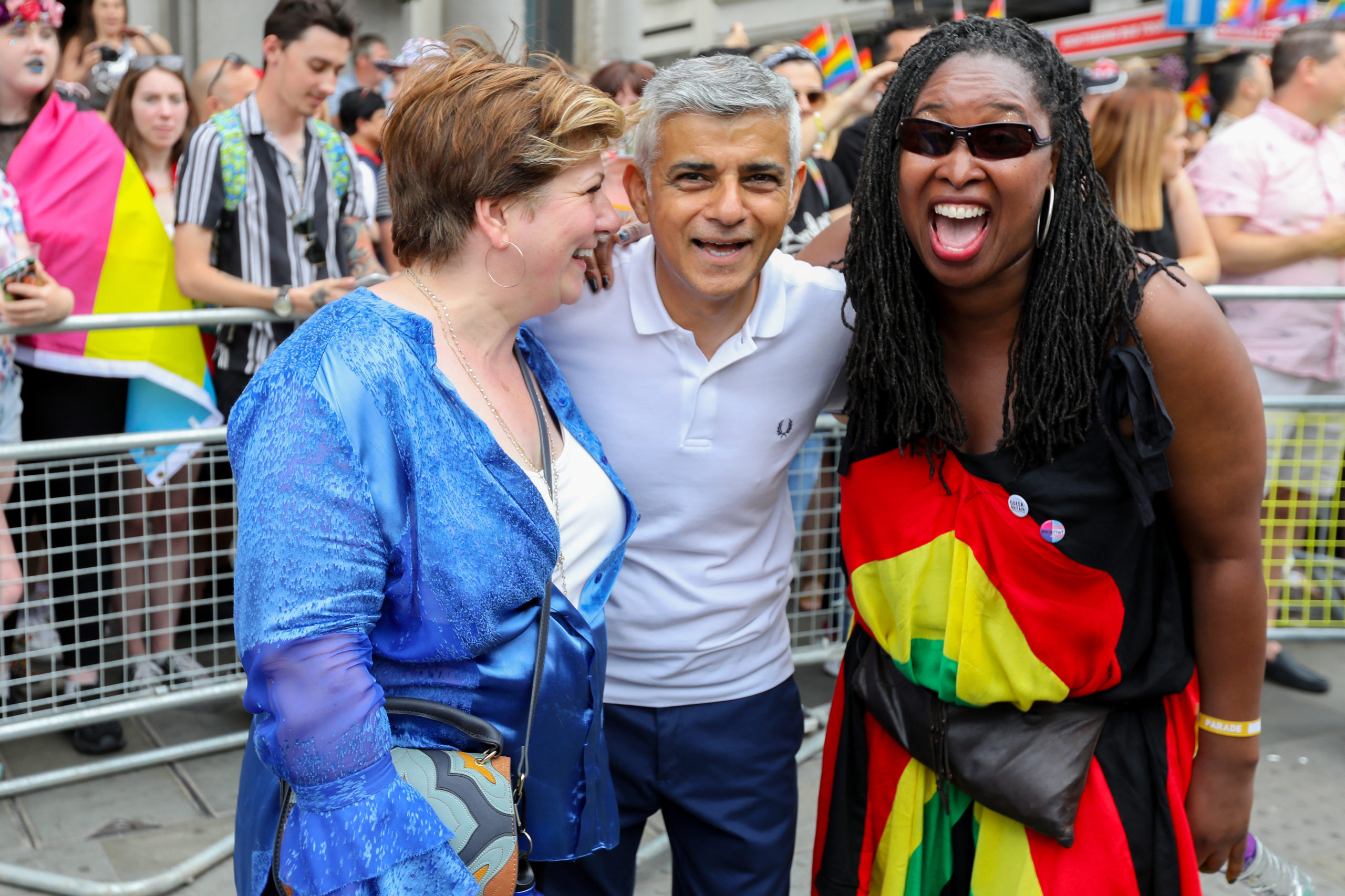
Emily Thornberry (L), London Mayor Sadiq Khan (C) and Dawn Butler during Pride in London 2019. (Tristan Fewings/Getty Images for Pride in London)
It’s really nice when people come for the first time, when they say, ‘It’s the first time I felt that I’m able to be myself or come out.’ And I think that’s just amazing. But for me, it’s just a way to have a good time and chill with my friends and be who you are. The first time I took a couple of members of my team, and they’d never been before, they were just overwhelmed with how much love was in the air.
People always try to divide people or separate people. I always say, wouldn’t you rather people loving than people hating?
For me Pride is a celebration of love and happiness and acceptance. I don’t use the word ‘tolerance’, which I completely hate. I think we need to start using the language of acceptance. And that’s what Pride is to me.
You’re one of the most outspoken LGBT+ allies in parliament, of any political party. When did the fight for LGBT+ rights become an integral part of your political agenda?
I think the moment that gay rights really became a part of my life was when one of my best friends came out as gay to me. I wasn’t the first person that he told – he had told some friends before me, and they stopped talking to him.
He eventually came out to me, and I was like, ‘Oh, yeah, cool.’ Actually, I sent him a card. A well-done-for-coming-out card.
I actually sent him a card. A well-done-for-coming-out card.
He couldn’t understand my reaction as to why I was so happy for him. And I couldn’t understand why he didn’t feel that he was able to tell me. So we had this long talk where, you know, he was just so frightened and scared. He didn’t want to lose any more friends and I thought, well, how on earth did you think that you would lose me as a friend?
I think because of that, I’ve been so conscious of making sure that everybody knows that I really don’t care. It doesn’t matter to me, who you are doesn’t matter to me, or who you love it.
It matters to me how you behave, if you’re a good person, if you’re a nice person – but who you love, how you identify? If you’re non-binary, if you’re gay, I really don’t care.
So, it happened a really, really long time ago. I mean, we laugh about the card now, we still talk about it. It was hilarious. He thought I was taking the piss, actually. I wasn’t. I think I wrote a poem in there as well.
Was it a poem that someone else had written that you wrote out or did you write a poem for him?
Oh no, it was my own poem. I used to write poems all the time. It was my thing, whenever I felt strongly or passionately about something, I’d just be inspired to write a poem.
Can you remember any of the poem?
No, I can’t, it was a long time ago. I can’t. He’s probably still got the card, knowing him.
That’s so heartwarming! Last week, we saw a pretty big backlash after the Labour Campaign for Trans Rights released a set of pledges – which you signed – that vowed to expel people who hold transphobic views from the Labour Party.
What do you make of the extreme reaction that people are having to a pledge that essentially just says there’s no room for bigotry in Labour?
This whole trans debate is so toxic, it’s worrying. And part of it is being orchestrated deliberately by the Tories.
When they delayed reforming the Gender Recognition Act, they could have just adapted it, changed it and we could have moved on, but they decided to delay it and delay and delay it, and because they created this void, that void was then filled with lots of misconceptions, and lots of hatred.
The Tories even did focus groups to see how people felt about trans issues. They knew that it was an issue that people were beginning to feel strongly about. Some people genuinely were concerned about safe spaces for women. But, ultimately, trans women have been around for many, many, many, many, many years. And actually, organisations have dealt with it adequately for years.
But, ultimately, trans women have been around for many, many, many, many, many years.
Whipping up hatred towards the trans community, I think it’s kind of a stain on society. And it’s so harmful. You’re talking about maybe one per cent of the population, but this one per cent is more susceptible to harming themselves.
And then a lot of people are going to attack trans people even further, they’re then contributing to somebody else’s pain. And I think why would you want to contribute to somebody else’s pain?
.@DawnButlerBrent just said: ‘trans rights’ pic.twitter.com/o29RMIqJWH
— PinkNews (@PinkNews) February 21, 2020
You know, just replace trans with anything else: replace trans with a black person, replace trans with a woman, why would you want to contribute to somebody else’s pain or the risk of somebody else harming themselves or somebody else committing suicide? Why would you want to do that?
I am saddened by it, and I’ve tried my best to talk through some of the issues, reassure people where there are some genuine concerns. But it is a concern, the division and the hate, and then it’s spilling over into other things. I have lesbian friends, who consider themselves to be butch lesbians, and they say they go into the toilets now and people are saying ‘you don’t look like a woman what are you doing here?’
Why are we talking about people’s genitals?
Why are we policing toilets? Why are we talking about people’s genitals? When did we become that country? We’ve got to be really careful about how we are as a society.
We’ve got to be careful about where that road leads to, history has taught us about dividing and ruling and what that does to society as a whole. And I think we need to be really, really careful about understanding how hate and division is injected into society.
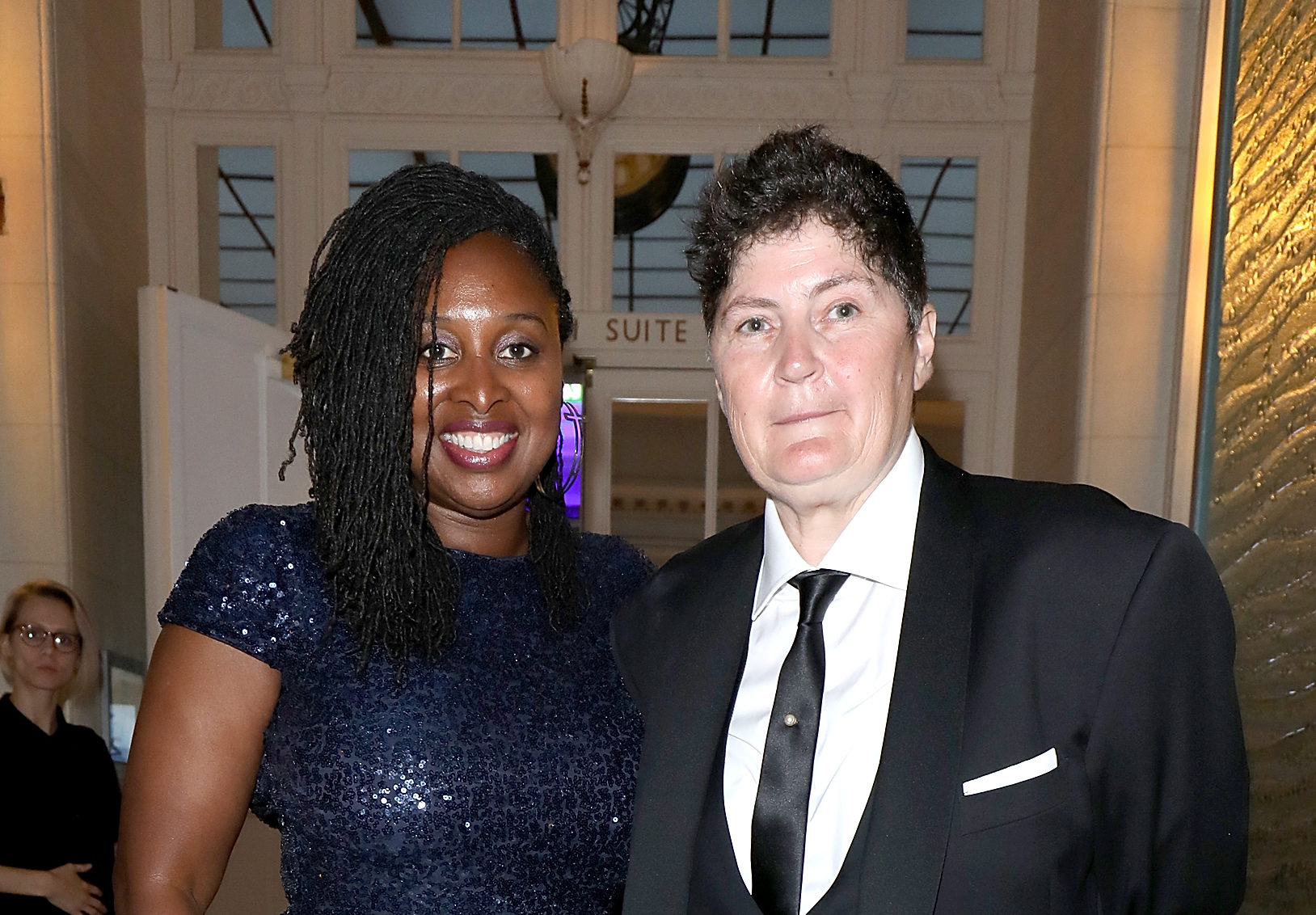
Dawn Butler with her friend, the DIVA Magazine Publisher Linda Riley. (Tim P. Whitby/Getty Images for Diva Magazine)
PinkNews: A lot of the backlash resulted – especially over the weekend, in the papers – in a lot of people who aren’t trans trying to define what transphobia is or what a transphobic view is.
Two of the organisations who are named in those pledges were called “trans-exclusionary hate groups” by the Labour Campaign for Trans Rights. They deny that they’re transphobic. Who do you think should be in charge of defining what a transphobic view is?
Dawn Butler: So, obviously, trans people will define what transphobia is. You cannot be the voice of other people with those lived experiences.
It’s the same with anti-semitism – Jewish people define what anti-semitism is. Trans people define what transphobia is.
Trans people define what transphobia is.
I wasn’t keen, to be honest, on naming organisations. And that’s why I had to have a conversation to clarify the wording around it, because what we don’t want to do is advocate any aggression in any way. So I did call to talk to them to clarify the wording.
But it’s just not – it’s not a joke. We’re talking about people’s lives and we’re talking about people who have lived experiences of being abused and attacked for who they are. And I think we need to be a society that cares about others.
In a Good Morning Britain interview recently, you created a bit of a stir when you were, I think, trying to explain that nobody has a sense of their gender when they’re born. Would you like to use this opportunity to elaborate on what you were trying to say?
First of all, I wasn’t expecting to be talking about penises so early in the morning.
So Richard was trying to use the tactic of quick firing questions, and then, trying to talk about sex and not talk about gender. And he’s talking about penises, and trans women and penises and I’m just like, what’s the point that you’re making in regards to, you know, people get obsessed.
I’ve never had so much conversation about penises in my life. And then he started talking about XY and XX chromosomes. And so I was trying to make the point – but it’s very difficult to make the point in three or four seconds, I think the real thing about this is we shouldn’t have this debate in sound bites.
We should not have the trans debate in sound bites, it doesn’t do the debate any justice. It doesn’t do the cause any justice and all it does is create more confusion, because actually, it is very complex. But the simple thing is that trans women are women and trans men are men.
The simple thing is that trans women are women and trans men are men.
The thing is, when you are born, you’re told by the doctor, ‘Congratulations, it’s a boy’ or ‘Congratulations, it’s a girl.’ But I was trying to make the point to him that, you know, it’s also not a given. There’s lots of people that identify as non binary. And what would you say about people who are non binary?
But ultimately, for me, the bigger picture is, we shouldn’t really be so het up and worried about how people identify themselves, as long as they are good people. As long as they are not harming others. We should be worried about other things. Climate change, for one, just to pick something out of the air. You know, there’s climate breakdown. We have, you know, forest fires and floods.
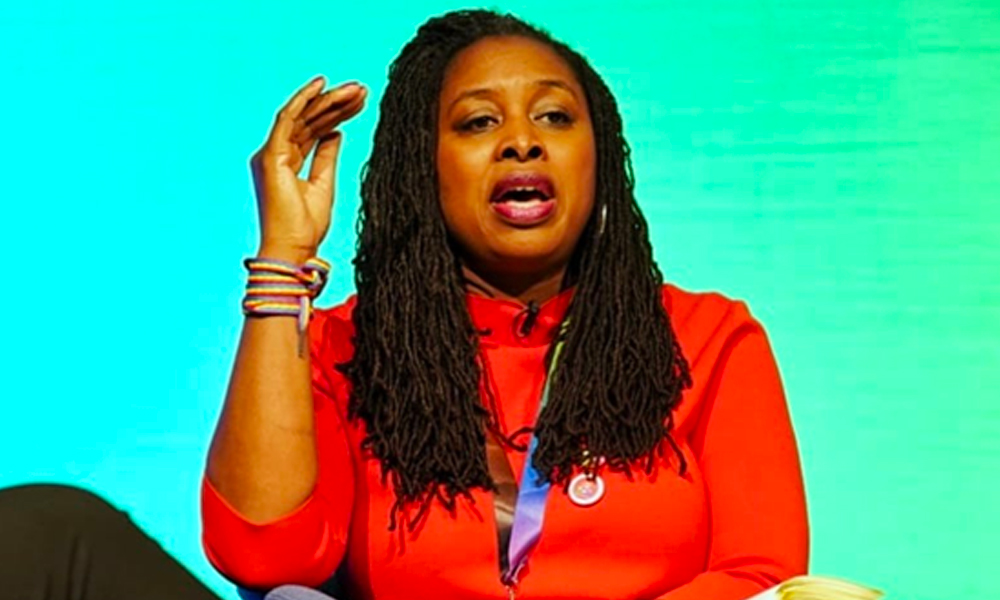
Dawn Butler speaking at the LGBT+ Labour leadership hustings, presented by PinkNews and supported by Diva. (PinkNews)
PinkNews: You mentioned the Tories earlier. Let’s talk about them a little bit.
Dawn Butler: Do we have to talk about the Tories?
In their manifesto, which mentioned LGBT+ people just three times, they said that they would “help teachers tackle bullying including homophobic bullying”.
If a school child called their gay classmate a “tank-topped bum boy”, what do you think their punishment should be?
Well, they would have to be taken out of the classroom, and they would have to be dealt with by the school and educated.
This is the thing that really gets me: Boris Johnson hasn’t apologised. He hasn’t apologised for anything that he has said, for all of the homophobic slurs or the racist slurs. Why is he getting away with it? I mean, it’s just outrageous. But the fact that we have somebody like that in Number 10 just shows you the task ahead of us. It shows you the mountain that we have to climb in, in regards to protecting rights.
In the Labour manifesto, there was a pledge to roll out PrEP on the NHS. What are your thoughts on PrEP and do you have a message for our health secretary Matt Hancock when it comes to rolling it out?
I say to Matt Hancock, just get on with it. At the end of the day, PrEP is proven to stop the spread of HIV. So just roll it out, what are they waiting for? There’s no reason to wait for it.
Another thing that’s come up a lot in the last year is protests against LGBT+ inclusive education. It’s been kind of a political football ever since Section 28, essentially.
What were your first thoughts when you began seeing and hearing about the protests outside primary schools in Birmingham? Which were protests by parents who oppose their kids being taught that some children have two mums and some children have two dads.
You can’t teach a child to be gay. You can have an environment where a child feels comfortable in being who they are.
You can’t teach a child to be gay.
And my thoughts are this: if you’ve got a child who’s struggling to come to terms with who they are, and then it results in them committing suicide, you would say, what could we have done to prevent that? I wish we could have done more.
If somebody says to you, the thing that you can do is to create a safe space for that child to be who they are, so that when somebody says that they’re gay, for instance, that they are not bullied. By doing that, you would save that child’s life. The question is: would you do it? And if the answer is yes, then you should be supporting inclusive education in schools.
Here's why @DawnButlerBrent is a gay ally 🌈 pic.twitter.com/AwjpAS6NJX— PinkNews (@PinkNews) February 21, 2020
Young LGBT+ people are overrepresented in homelessness statistics. And that is often because they’ve been forced to leave home when they come out as LGBT+. What would you do to tackle this as deputy leader of the Labour party?
We have to have specific and concentrated programmes. I am a huge supporter of the Albert Kennedy Trust and the work that they’ve done, and Kaleidoscope as well, the work that they’re doing, ensuring that young people who are LGBT+ are not homeless at the time when they’re the most vulnerable.
It’s a real shame that we’re not in government, because we would have progressed so many of these issues, that it’s actually quite heartbreaking that we’re not able to do that.
If there’s a Labour government, we will create a society that’s safer for people to come out in, and safer for people to be who they are. And that is vital in protecting people, not just at school, but at work. There are so many people at work, who are too scared to talk about who they are. And what that means is they’re not bringing their whole self to work. So it means that they’re not actually being as effective as they could be in the workplace.
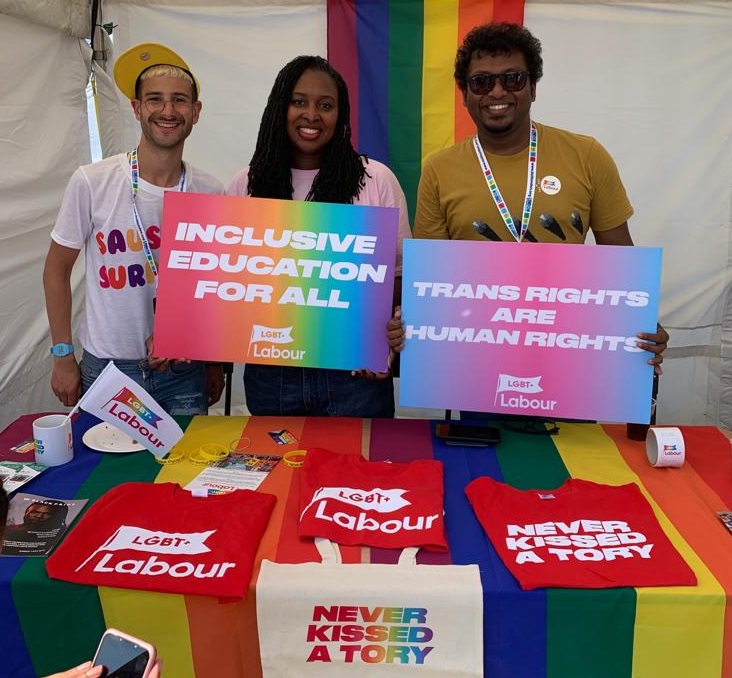
Labour’s shadow equalities chief Dawn Butler at UK Black Pride (Dawn Butler)
PinkNews: Labour’s manifesto also included a pledge to broadly put LGBT +equality at the heart of government. And that was to begin with a dedicated LGBT+ ambassador in the foreign office. Would you press to keep this in the next manifesto and how might you expand on that?
Dawn Butler: Oh absolutely, everything in the manifesto will stay. It’s important that we get our own house in order, but also that we promote equality across the globe.
We should be doing more as the United Kingdom in terms of ensuring that LGBT+ rights are included around the world and in the Commonwealth. It’s a disgrace that in some countries, it’s illegal to be gay. It’s nonsensical. And I think where we’ve got influence, we should be using it. And this government isn’t using it, which is, again, a shame.
It’s a disgrace that in some countries, it’s illegal to be gay.
Let’s move away from the Tories. This is a question about sex work – LGBT+ people are disproportionately likely to be sex workers, especially trans women who can end up doing sex work to pay for transition-related costs. The sex workers’ right’s movement is fighting for the decriminalisation of sex work on the basis that it would maximise legal protections for sex workers, it would increase recourse to legal justice systems and create a safer working environment.
Where do you stand on this issue?
So, the sex law is out of date. And it needs it amending. The question is, how do we amend it? We have to have a debate around it.
My view is that whatever we do, we need to protect the most vulnerable and the most vulnerable in the equation of sex work is the sex worker. And so whatever happens you have to look at whether the sex worker is more or less protected in terms of what you’re suggesting as a solution.
Some people say you criminalise the buyer and that will reduce the demand. And we have to look at the statistics around that to see if that really has reduced the demand, or whether it drives sex work deeper underground. And if it drives sex work deeper underground, then you make the sex worker more vulnerable.
If it drives sex work deeper underground, then you make the sex worker more vulnerable.
For me, at the core of this is whatever we do, it has to protect the sex worker and make them safe.
And then people say to me, so you’re promoting or encouraging sex work. And I say, you know, sex work is the oldest profession in the world. It’s older than accountants. Apparently, sex work came first and then accountants came second, probably because they were counting the money from the sex workers. But anyway, that’s apparently the order.
I’ve spoken to sex workers, I’ve interviewed sex workers. When I worked at the trade union, I was the officer that looked after sex workers. We had a sex workers branch and so I was the officer that looked after sex workers. So I’ve spoken to a lot of sex workers. Some vulnerable, some not vulnerable. All agreed that we need to have an exit strategy for sex workers so sex workers can safely come out of that work and go into something else.
And that needs a strategy because they need to be protected. You know, they might have a criminal record. Now all of that needs to be considered and protected and safeguarded, because there’s safeguarding issues as well.
'Sex law is out of date' says @DawnButlerBrent pic.twitter.com/pumh2GBL28— PinkNews (@PinkNews) February 21, 2020
So we need to have a real debate around sex work. There’s all different models that people are promoting. And to be honest, I think we need to look at the evidence. And it just needs to be open debate. And we need to be honest about it. And it’s a difficult debate to be had. But it needs to be had.
Do I think this government will have the debate? No, I don’t think they’ll have the debate around sex work. But they really should.
Do you think it’s going to be important that sex workers voices are heard in that debate?
Sex workers’ voices are vital to the debate.
We can’t keep being the voice of a particular group, when that group exists. If the group exists, hear their voice, and hear all of their voices, the diversity of their voices.
Some people say, well, we refuse to listen to sex workers because you’re only talking to the middle-class sex workers and not the working-class or more vulnerable sex workers. Well, hear everybody’s voices. Hear the ones who are vulnerable.
Sex workers’ voices are vital.
And in fact, if you hear the voice of vulnerable sex workers, you wouldn’t take away their rights to be in the country or try to deport them. When the brothel gets closed down, because they’re found and then you say, right, okay, you’ve got no right to stay in the country, and then you send them back to a country where they are at a higher risk… Currently, our laws do not make sense.
What is vital is we have to protect the vulnerable people, which are the sex workers and, yes, their voices must be heard – and the whole spectrum of sex workers, their voices must be heard. And then once you have the debate, you come up with the solution.
We shouldn’t be saying, well, this is the way to do it because I’ve read it in a book.
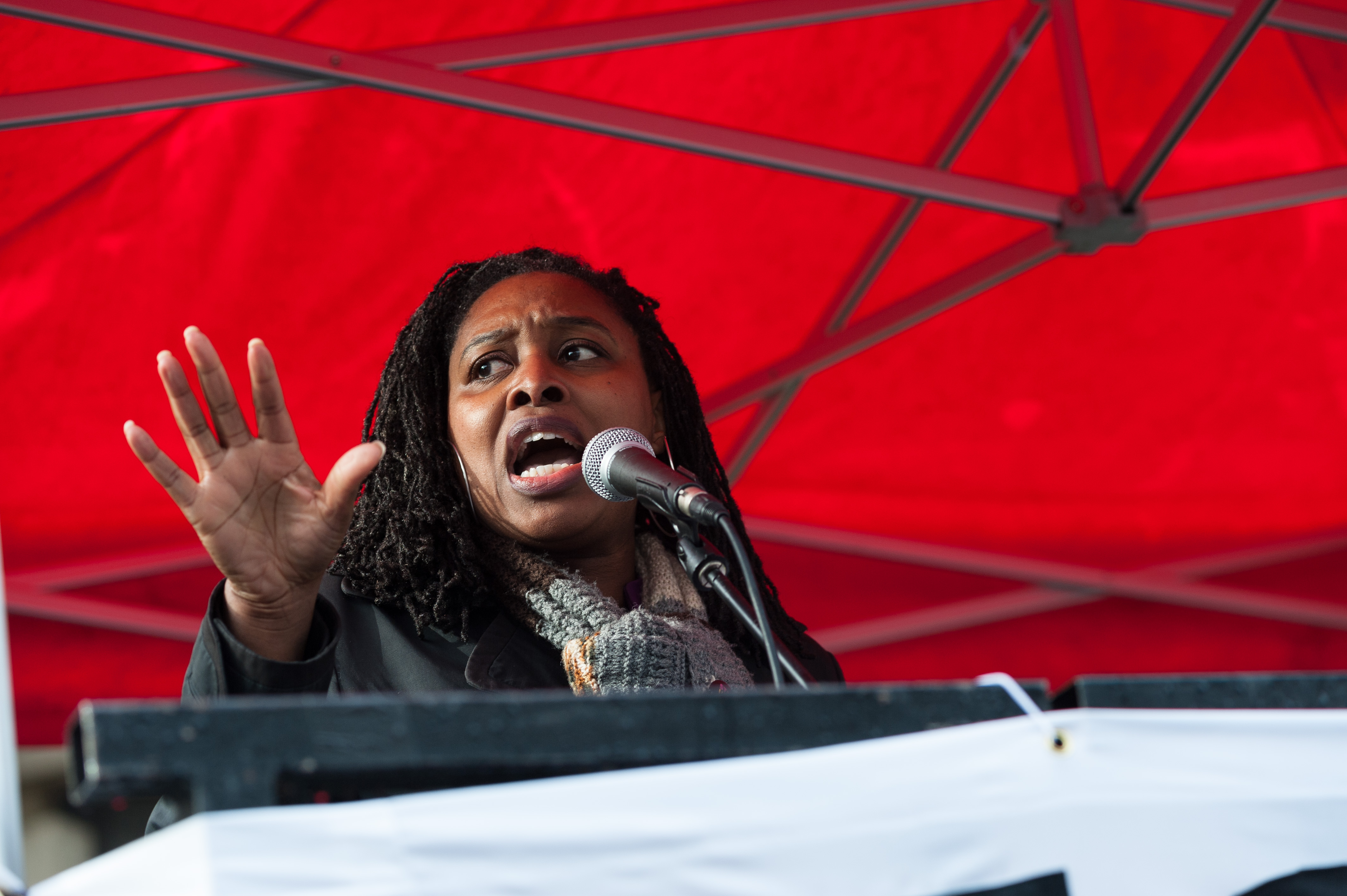
Labour MP Dawn Butler addresses the crowd during a rally outside the US Embassy on February 04, 2017 in London, England. (Wiktor Szymanowicz/Barcroft Images)
PinkNews: We’ve got some quick-fire questions for the end, but first, I realise we didn’t quite cover – on your support for GRA reform, does that include extending legal recognition to non-binary trans people?
Dawn Butler: Oh yeah, I mean non-binary trans people need protections, too.
There’s a lot more people who are identifying as non-binary than they are identifying as trans – and so protections are needed.
The other one on that is about healthcare. At the moment, there are eight specialist Gender Identity Clinics in the whole of England and there’s, on average, from going to your GP and asking for a referral, on average people wait two years for a first appointment. The NHS recommended waiting time is 18 weeks.
What would you like to see happen to address this issue of trans people not being able to get health care?
I think we have to look at the healthcare issues around trans people, and I think we also have to link that to the consequences of trans people not getting the help and advice and the care that they need.
Because, ultimately, people will say, I’ve heard people say, well, don’t you think that’s a waste of money? And I say, well, if you look at it in the round, and you don’t give the support and advice, what happens is that you end up spending more money in different parts of the NHS because people self harm, for instance, or people who are suicidal, for instance.
We need to look at the services that are provided to trans people and see whether they are adequate.
So ultimately, we need to look at the services that are provided to trans people and see whether they are adequate and adequately met.
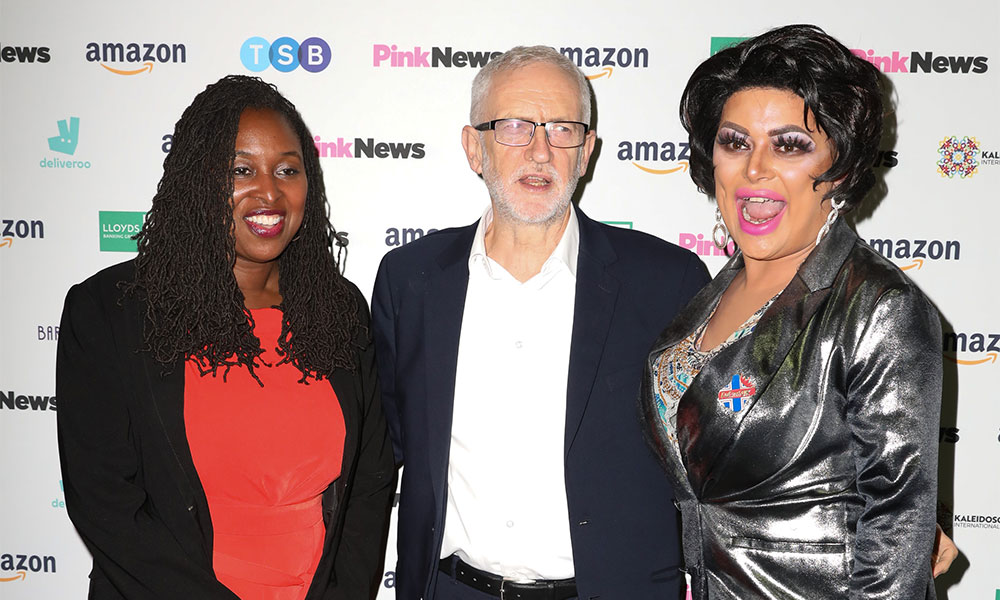
Drag Race UK queen Baga Chipz met Labour leader Jeremy Corbyn and shadow equalities minister Dawn Butler at the PInkNews Awards 2019. (PinkNews)
OK, so these are some quick ones. Do you think that the UK is ready for an LGBT+ prime minister?
Why not? I think, I mean, I think the country should be ready for anything.
I think the country should be ready for a black female deputy leader!
Do you have a message for people who might be in the closet and struggling to come out as LGBT+?
You might get a card! You might get a poem, as well!
My message for people who are struggling to come out is that I hope that we are going some way in creating a safe society and a safe space for you to come out and be your true authentic self, that you are valued and loved for who you are, as an individual and a person. And whenever you feel it’s safe to do so, you should do so.
Finally, why should LGBT+ people vote for Labour?
Because we care. And I think when you’ve got a government that doesn’t care, it creates hostility, it creates anger, it creates an environment that’s dangerous.
And I think what you need is to have a party and a government that is open, that is acceptable, that it accepts people for who they are. That doesn’t judge people because of who you love or how you identify. That we focus on the bigger issues, not the small issues.
Being who you are or being gay just isn’t a big deal. And I mean that with all the love in the world, that, you know, it isn’t a big deal that you can be who you are.
And I do hope that one day we will have a government where the Prime Minister doesn’t refer to gay men as bum boys.
Because you deserve better than that and the country deserves better than that.

